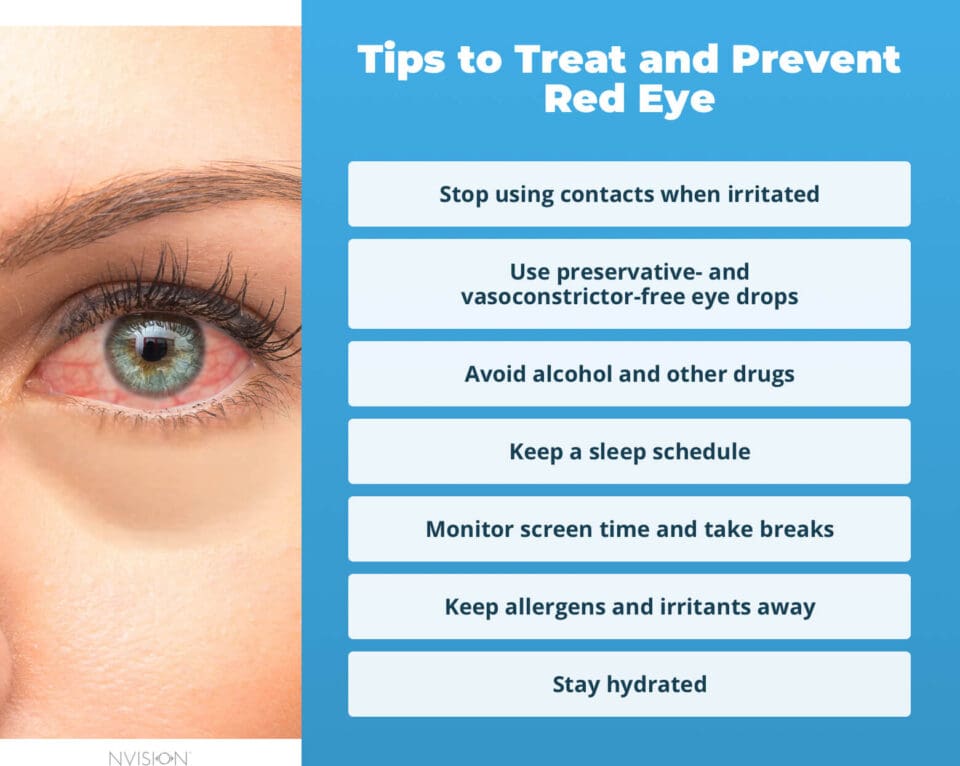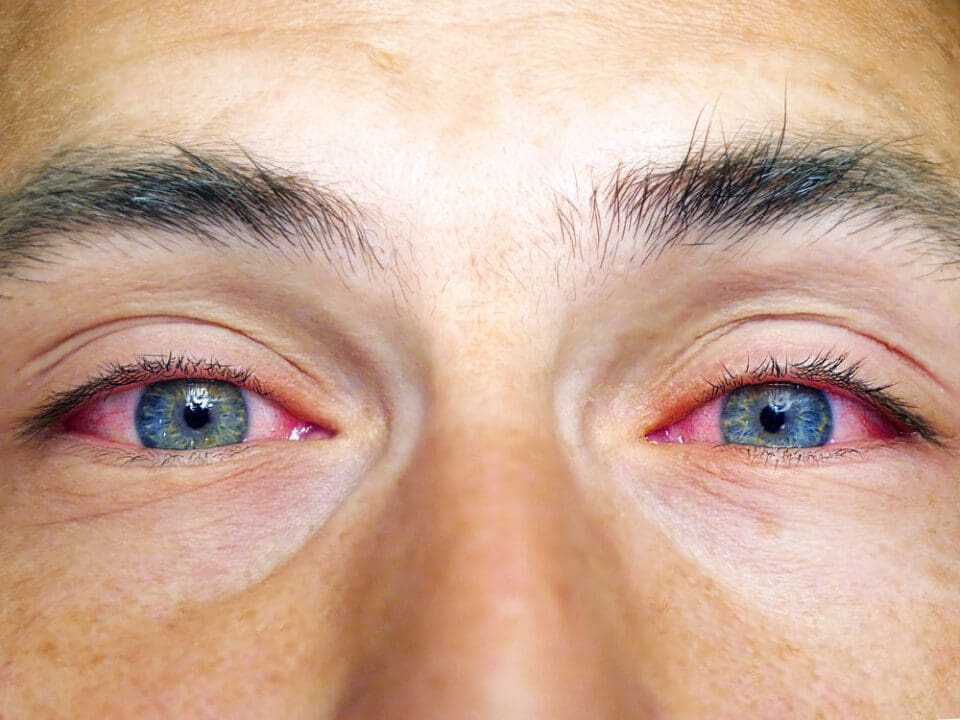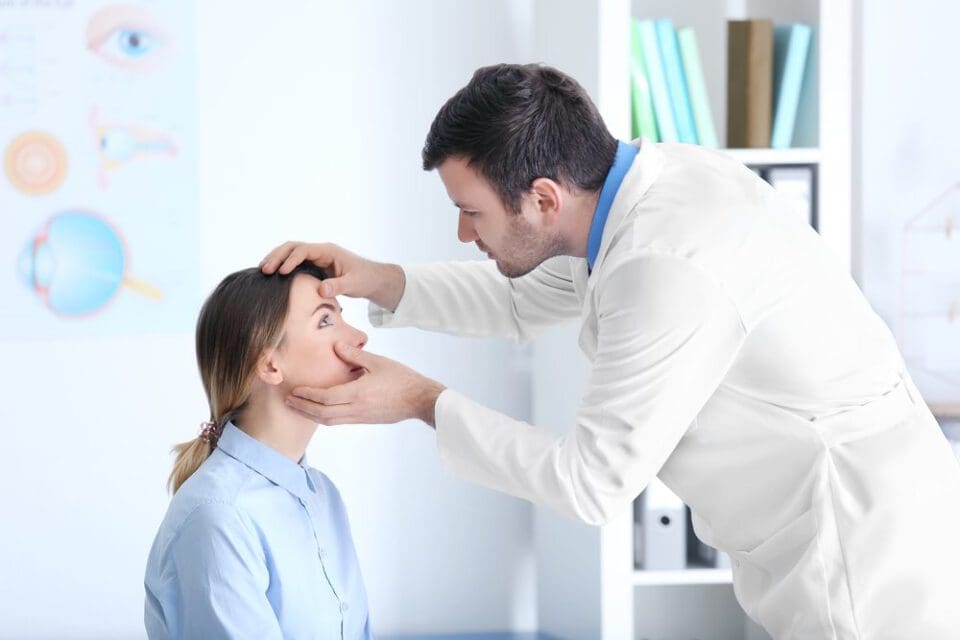Visible Red or Blue Eye Veins: What To Do About Them?
Home / Eye Health and Preventive Care /
Last Updated:
The human eye includes a vein and an artery, along with all the branching capillaries within the eyeball itself. Under normal conditions, exactly none of the circulatory system is visible within the eye to onlookers; visually, nothing shows but the pupil, iris, and white, with perhaps a hint of pink near the tear ducts.
As said, that’s under normal conditions, for at least most of our lives. There are some exceptions, such as after a crying spell, when the dilated blood vessels inside the eye give us a red-eyed appearance. For the most part, the white parts of your eye should stay white.
Visible veins within the eyeball, or visible redness, can be a sign of many temporary conditions and a host of more serious medical conditions as well. In addition, almost nobody wants red eyes, at least not if they care about their appearance. The most serious problems that have eye redness as a symptom can even lead to permanent eye damage and loss of sight, so this is one area to be concerned about.
We’ll go over the complex world of eye anatomy, break down the common causes and triggers, and outline when to seek medical attention, when to consider cosmetic surgery, and when it’s just a sign that you need more sleep.

Table of Contents
Red and Blue Eye Veins
The human eye is a complex little system packed into a sphere just a couple inches in diameter, an anatomical wonder. We have a full eye anatomy breakdown here, so we won’t repeat it all and just focus on the blood vessels.
Red blood vessels are the ones inside the eye, normally not visible under conditions of perfect health. Blue veins are the ones just under the eye, in the lower eyelid or skin just below that. Blue veins can also be visible in this area, and when they are, it’s usually a sign of aging. Veins visible through skin tends to happen more often with a light skin complexion.
You deserve clear vision. We can help.
With 135+ locations and over 2.5 million procedures performed, our board-certified eye surgeons deliver results you can trust.
Your journey to better vision starts here.
Occasional visibility is not a point of concern, given that it happens to almost everyone. But chronically bloodshot eyes are a sign of several underlying problems, including conditions that could put your vision in jeopardy.

Common Temporary Causes of Eye Redness
Let’s start with the common triggers for eye redness, the kind most of us experience at least a few times in a lifetime:
- Irritants such as dust, pollen, or smoke getting in the eye
- Exposure to chemical irritants such as shampoo or chlorine from a swimming pool
- Allergies
- Lack of sleep
- Eye strain
- Dehydration
- Prolonged exposure to sunlight
- Use of alcohol or drugs
- Crying or stress
- Overuse of contact lenses
All of these are pretty self-explanatory. Bear in mind that plain old pollution can irritate the eyes as well, so if you live in an industrial area, a smoggy city, or close to frequent wildfires, you know the cause of your reddened eyes.
A Word About Cannabis…
Since cannabis has been legalized in most of the United States, and indeed in several other countries, we should address the popular plant here. Cannabis use can indeed redden your eyes while under the effects. This is temporary and – so far as we know with research to date – not known to be damaging.
The eye-reddening effect of cannabis is not just from the smoke; cannabis contains compounds which dilate your blood vessels, including in your eyes, which gives you the stereotypical “stoner eyes,” bloodshot without much visible veins. So regardless of whether you smoke, dab, or vape, or even pop an edible, the effects will give you red eyes anyway at sufficient doses.
This even extends to cannabis (or hemp) variants without THC; delta 8, CBD, and virtually any active cannabinoid triggers the dilation of blood vessels.
A Word About Alcohol…
Alcohol, legalized for far longer than cannabis, also makes your eyes appear red. More importantly, it can affect vision itself, and can even cause long-term damage to the eye with excessive use. In the short-term, alcohol can cause your vision to go blurry, and also go out of focus, producing the “seeing double” effect.
Heavy, prolonged alcohol abuse can take an alarming toll on your vision, through several avenues. Alcohol abuse over a lifetime can cause distorted vision, affect the pupil’s ability to dilate correctly, enlarge blood vessels leading to permanent red-eye, accelerate age-related macular degeneration, and even cause eventual blindness.
Since prolonged alcohol abuse can also cause damage to your internal organs, such as the liver, it can also cause eyes to appear yellow with jaundice and other effects over time.
Medical Conditions Associated With Reddening of the Eyes
Eyes with visible blood vessels, bloodshot eyes, or persistently red eyes can also be a sign of more serious problems.
- Blepharitis – Can cause eye redness, inflammation, and eyelid swelling.
- Conjunctivitis – Infection of the eye, AKA “pink eye”
- Corneal ulcers – Can occur as sores on the cornea, caused by infection
- Uveitis – Inflammation of the uvea, or middle eye where the pupil lies
- Glaucoma – An eye disease which can cause redness and irritation in acute cases
- The common cold or flu – Since colds affect mucus membranes, they can also redden eyes
- Injuries to the eye itself
All of the above conditions are accompanied by other symptoms which would be hard to miss, such as pain, discomfort, itchy eyes, watery or dry eyes, sinus pressure, discharge, and so on. If you have red eye from any of the above conditions or suspect that they are the cause, seek medical help immediately.
You deserve clear vision. We can help.
With 135+ locations and over 2.5 million procedures performed, our board-certified eye surgeons deliver results you can trust.
Your journey to better vision starts here.
Red Eye Veins – What to Do or Avoid
There may be some factors you can’t change, such as being around pollution or having a job which brings your eyes into contact with irritant factors. But here’s some measures you can take to lessen eye-reddening:
- If you use contact lenses, stop. Use glasses instead.
- Avoid alcohol and drug use
- Monitor your screen time if it’s giving you eye strain
- Stay hydrated
- Use moisturizing eye drops if you suspect your eyes are just dry
- Get plenty of sleep
Eye strain from staring at the screen of a digital device is a frequent cause of eye redness – and also an unavoidable consequence of life in the 21st century. If you have an office job where you’re staring at a screen all day, here;s a few tips to go easy on your eyes:
- Take a break every 30 minutes or so, resting your eyes
- Turn down your screen brightness so it’s just visible, but no more
- Try installing a darkened device theme or desktop theme
- Use web browser extensions which flip web page colors, resulting in a dark background
For some reason, all of civilization settled on the computing standard of black text on a blaring white background, as opposed to light text on a black or dark gray background. Then we all work in the office all day and wonder why we go home with headaches and eye fatigue.

When To Seek Help From a Doctor For Eye Redness
Seek medical attention in any of the following cases where you have bloodshot eyes, red eyes, or visible blood vessels in the eye:
- After an injury to the eye area
- If you have a headache with confusion or blurry vision
- You are seeing halos around lights
- You have nausea and vomiting
- You experience eye pain and vision changes
- Redness persists for several days (despite counter-measures)
- You are very sensitive to light
- Your eyes leak discharge or puss
- You are taking a blood-thinning medication
What About Blue Veins Under the Eye?
The skin around the eyes is one of the most delicate spots on the body. This makes it prone to wear, which can sometimes mean the veins in that area (periorbital veins) become visible with age or injury.
While not dangerous, many people find these veins unsightly and associate them with aging. If blue veins in your eyes bother you, there are cosmetic procedures that can correct them, such as microphlebectomy, laser treatment, or sclerotherapy.
Of these procedures, sclerotherapy is often preferred. With this procedure, the veins are injected with a solution that causes them to collapse and fade. Sclerotherapy tends to cause little bruising. It is usually not very painful and comes with few risks.
You deserve clear vision. We can help.
With 135+ locations and over 2.5 million procedures performed, our board-certified eye surgeons deliver results you can trust.
Your journey to better vision starts here.
References
- Anatomy of the Eye. Kellogg Eye Center.
- Eye Redness. Mount Sinai.
- What Is Branch Retinal Vein Occlusion (BRVO)? (November 2018). American Academy of Ophthalmology (AAO).
- Muscles, Nerves, and Blood Vessels of the Eyes. (March 2019). Merck Sharp & Dohme Corp.
- Red Eyes (Bloodshot Eyes): How to Treat Red Eyes. (July 2019). AAV Media.
- Eye Redness. (August 2018). MedlinePlus.
- Large Blue Veins Near the Eye. (August 2014). California Vein Specialists.
- It’s Not the Smoke from a Joint That Makes Your Eyes Red. (July 2018). McGill Office for Science and Society
- What to know about the effects of alcohol on the eyes. (Dec. 2022). Medical News Today.
This content is for informational purposes only. It may have been reviewed by a licensed physician, but is not intended to serve as a substitute for professional medical advice. Always consult your healthcare provider with any health concerns. For more, read our Privacy Policy and Editorial Policy.
